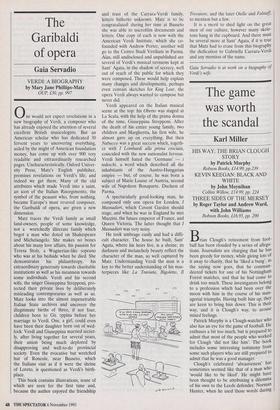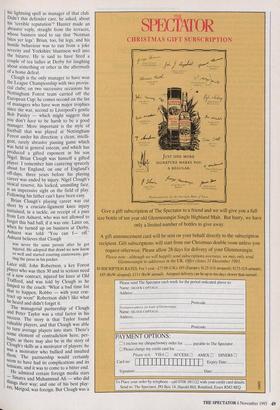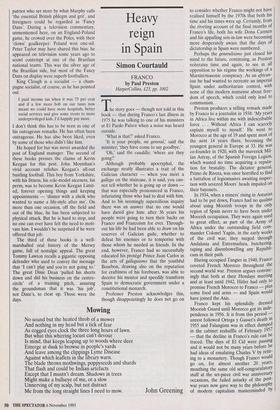The game was worth the scandal
Karl Miller
Brian Clough's retirement from foot- ball has been clouded by a series of allega- tions. Journalists are charging that he has been greedy for money, while giving lots of it away to charity, that he 'liked a bung', as the saying now goes, that he comman- deered tickets for one of his Nottingham Forest matches, and that he had come to drink too much. These investigators belong to a profession which had been over the moon with him in the course of his man- agerial triumphs. Having built him up, they are keen to bring him down. This is their way, and it is Clough's way, to arouse mixed feelings. Patrick Murphy is a Clough-watcher who also has an eye for the game of football. He enthuses a bit too much, but is prepared to admit that most of the people who worked for Clough 'did not like him'. The book includes some interesting testimony from some such players who are still prepared to admit that he was a good manager.
Clough's celebrated 'abrasiveness' has sometimes seemed like that of a man who 'would like to be liked'. He might have been thought to be attributing a dilemma of his own to the Leeds defender, Norman Hunter, when he used those words during
his lightning spell as manager of that club. Didn't this defender care, he asked, about his 'terrible reputation'? Hunter made an abrasive reply, straight from the terraces, Whose banners used to say that 'Norman bites yer legs'. Brian, too, bit legs, and his hostile behaviour was to run from a joke severity and Yorkshire bluntness well into the bizarre. He is said to have fired a Couple of tea ladies at Derby for laughing about something or other in the aftermath of a home defeat.
Clough is the only manager to have won the League Championship with two provin- cial clubs; on two successive occasions his Nottingham Forest team carried off the European Cup; he comes second on the list of managers who have won major trophies since the war, second to Liverpool's gentle Bob Paisley — which might suggest that You don't have to be harsh to be a good manager. More important is the style of football that was played at Nottingham Forest under his direction: a clean, intelli- gent, rarely abrasive passing game which was held in general esteem, and which has Produced a gifted exponent in his son Nigel. Brian Clough was himself a gifted Player. I remember him cantering sprucely about for England, on one of England's off-days, three years before his playing career was ended by injury. Nigel Cough's stoical reserve, his locked, unsmiling face, is an impressive sight on the field of play. Following his father can't have been easy. Brian Clough's playing career was cut Short by a cniciate-ligament knee injury sustained, in a tackle, on receipt of a pass from Len Ashurst, who was not allowed to forget this bad ball, if it was one. Later on, When he turned up on business at Derby, Ashurst was told: 'You can f— off.' Ashurst believes that Clough
was never the same person after he got Injured. He adopted that drawl we now know so well and started courting controversy, get- ting the press in his pocket.
Later still, John Robertson, a key Forest Player who was then 30 and in serious need of a new contract, injured his knee at Old Trafford, and was told by Clough as he linipeci to the coach: 'What a bad time for that to happen, Robbo — with your con- tract up soon!' Robertson didn't like what Ile heard and didn't forget it. The managerial partnership of Clough and Peter Taylor was a vital factor in his success. The story is that Taylor found valuable players, and that Clough was able to turn average players into stars. There's some element of contradiction here, per- h,,aPs, as there may also be in the story of lOugh's skills as a motivator of players: he was a motivator who bullied and insulted them. The partnership would certainly seen' to have had its complications and its tensions, and it was to come to a bitter end.
He admired certain foreign media stars
Sinatra and Muhammad Ali — who did thIngs their way; and one of his best play- ers, Metgod, was foreign. But Clough was a patriot who set store by what Murphy calls 'the essential British phlegm and grit', and foreigners could be regarded as 'Fancy Dans'. During a television commentary, unmentioned here, on an England-Poland game, he crowed over the Poles, with their 'clown' goalkeeper: Poland won one-nil. Peter Taylor may have shared this bias: he appeared on television some years ago to scowl contempt at one of the Brazilian national teams. This was the silver age of the Brazilian side, but most of the Fancy Dans on display were superb footballers.
King dough is a socialist — a cham- pagne socialist, of course, as he has pointed out.
I paid income tax when it was 73 per cent and if a few more bob on our taxes now meant we could have more hospitals, better social services and give some treats to more underprivileged kids, I'd happily pay more.
I don't think this has to be seen as one of his outrageous remarks. He has often been outrageous. He has also been liked, even by some of those who didn't like him.
He hoped for but was never awarded the post of England manager. The second of these books presses the claims of Kevin Keegan for this post. John Moynihan's vivid account relishes Keegan's all-out bustling football. This boy from Yorkshire, with his fitness, his role-model niceness, his perm, was to become Kevin Keegan Limit- ed, forever opening things and keeping appointments — 'dinner with a sheik who wanted to name a life-style after me'. On more than one occasion, off the field and out of the blue, he has been subjected to physical attack. But he is hard to stop, and no one can ever have felt the need to moti- vate him. I wouldn't be surprised if he were offered that job.
The third of these books is a well- marshalled oral history of the Mersey game, full of nostalgic appeal. The great Tommy Lawton recalls a gigantic opposing defender who used to convey the message that 'I can't play and you're not going to.' The great Dixie Dean 'pulled his shorts down and did his business on the centre- circle' of a training pitch, assuring the groundsman that it was 'his job', not Dixie's, to clear up. Those were the days.












































































 Previous page
Previous page